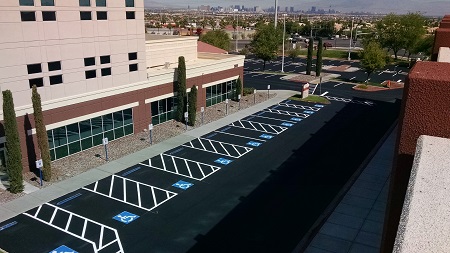Paving News & Insights
Restaurant Parking Lots – Does Yours Contribute to the Business Plan?
A solid business plan is an essential ingredient to any good business, including restaurants. It will include forecasting of revenues and expenses, trends and market analysis, a detailed customer service program and most likely a sustainability plan. As a restaurant owner or manager, you look to your staff and team members to contribute to the plans’ goals and help you reach them as the year progresses. But have you thought about how the restaurant’s capital assets can contribute?
A well-maintained parking lot can be a key participant in a company’s business plan. A parking lot is a capital asset that requires regular maintenance for optimal appearance, performance and longevity. The maintenance program for a lot can include ways for sustainability and compliance goals to be met, good corporate citizenship demonstrated and customer service extended beyond the front door.

Maintenance and Repair
A well maintained parking lot can last up to 12 years longer than its unattended-to counterpart. These activities can include addressing potholes quickly through patching, application of seal coat and restriping on a regular basis, replacement of catch basins as needed, and more. A lot may also require partial or complete replacement in order to provide a safe driving and parking surface. Projects can be executed using sustainable paving practices, both in material choices and installation methods.
A professional parking lot management company can work with you to create both short- and long-term plans to address immediate needs, plus longer range projects that will keep your parking lot in top condition.

Compliance
The Americans with Disabilities Act of 1990 established clear guidelines to make public facilities accessible to everyone. Restaurant owners and managers should work with a professional parking lot management company to ensure they have the right number and type of ADA compliant spaces, and that each has the appropriate striping and signage. Additionally, curbs, ramps and restaurant entrances must meet certain specifications to be in compliance with local and federal regulations.
Another area of compliance important to restaurant owners and managers for a parking lot is that of storm water management. If rainwater or snowmelt does not properly flow off the space, there could be a violation of the Clean Water Act, as well as other local and federal mandates.
A parking lot that is compliant to local and federal regulations will not only serve as a safe and welcoming space for patrons, employees and vendors, but also avoid costly fines and penalties. A good corporate citizen meets its legal, ethical and economic responsibilities, and your well maintained parking lot can help achieve this aim.

Customer Service
Before even a warm greeting or cool beverage, the parking lot is often the first experience a patron has with a restaurant. Having a clean, well-marked space for your guests to park creates a great first impression. Coupled with good food and drinks, timely and professional service, and other details that set your restaurant apart from your competition, a great parking lot helps leave a positive, lasting impression with your guests that will bring them back again and again.
As you look at your business plan, think about your parking lot. Should you create a budget for that needed maintenance and repair to bring this space up to code for compliance issues? Do you have a beautification program that will improve the customer experience before your guests meet the hostess? By working with a professional parking lot management company, your parking lot can begin contributing to the business plan.
Kansas Asphalt has field offices with experienced construction managers across the country, with certifications that range from traffic control to OSHA30 to ADA compliance to storm water management. For more information on how Kansas Asphalt can help your parking lot contribute to your sustainability, compliance and customer service goals, contact us at info@kai-pavement.com or at 877-384-2280. Kansas Asphalt is a certified woman-owned business.

